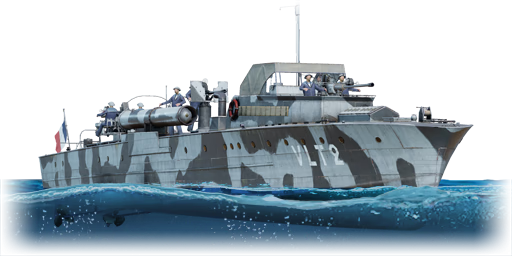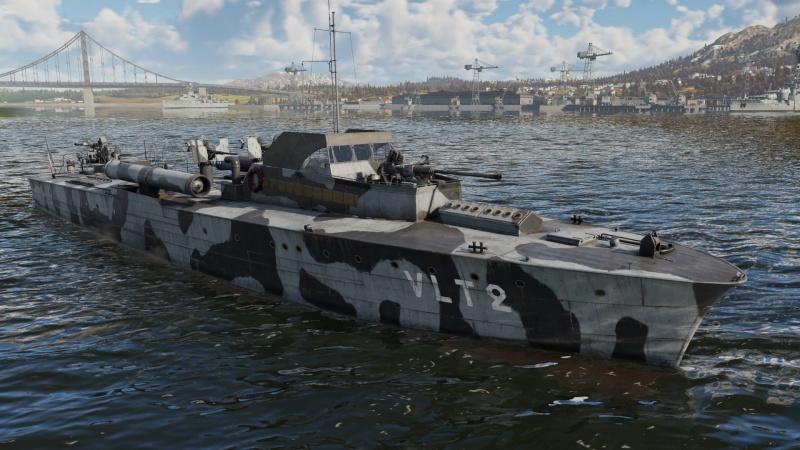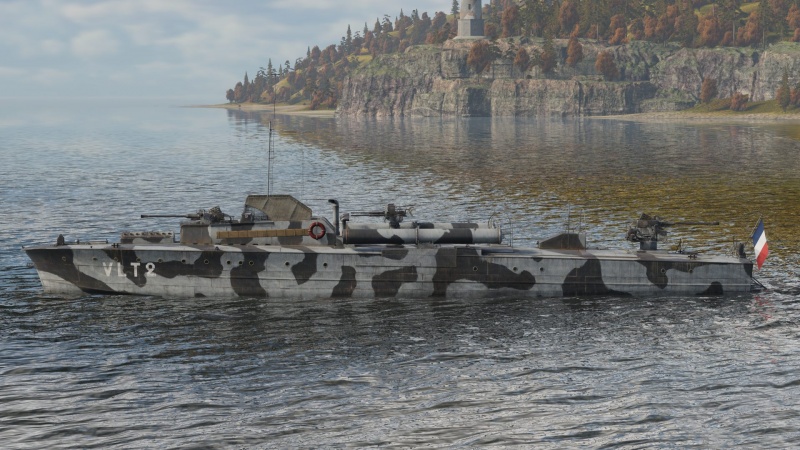Difference between revisions of "VLT-2"
Jareel_Skaj (talk | contribs) (→Description: New Description Project) |
(→Description) |
||
| (One intermediate revision by one other user not shown) | |||
| Line 7: | Line 7: | ||
== Description == | == Description == | ||
<!-- ''In the first part of the description, cover the history of the ship's creation and military application. In the second part, tell the reader about using this ship in the game. Add a screenshot: if a beginner player has a hard time remembering vehicles by name, a picture will help them identify the ship in question.'' --> | <!-- ''In the first part of the description, cover the history of the ship's creation and military application. In the second part, tell the reader about using this ship in the game. Add a screenshot: if a beginner player has a hard time remembering vehicles by name, a picture will help them identify the ship in question.'' --> | ||
| − | The '''VLT-2''' was a | + | The '''VLT-2''' was a French torpedo boat of the VLT series, developed from the Type 40K design by Charles Picker's Lorraine Dietrich company. Originating from a 1937 French torpedo boat programme, the Type 40K was initially intended for export but ended up being partially built in France and the UK. During World War II, some of these boats were seized by Germany and repurposed. Post-war, as France was liberated, the Meulan shipyards continued construction of several boats based on the Type 40K, including the VLT-2. Completed in the late 1940s, the VLT-2 was initially equipped with 1,100 hp VK-105 engines from Yak aircraft, but these were later replaced by German Jumo 211 engines. Despite showing impressive performance during trials, the VLT-2 and its sister vessel were deemed obsolete. The VLT-2 was decommissioned and dismantled in 1951, while the VLT-1 served as a model for export to the Israeli Navy before being dismantled in 1958. |
| − | Introduced | + | Introduced in [[Update "Seek & Destroy"]], '''{{Specs|name}}''' is notable for being the first motor torpedo boat in the game to feature swivel-mounted torpedo tubes. This capability, combined with her exceptional mobility, enables her to execute surprise attacks against large vessels. However, with only two torpedoes on board, she is unable to create effective torpedo walls, making it necessary to use islands and other hard cover to approach enemy vessels as closely as possible. Her gunnery armament is respectable, yet, like other wooden motor torpedo boats, she may struggle in direct confrontations with dedicated gunboats. The vessel's guns are divided into Primary and Secondary groups, allowing her to utilise AI gunners to engage enemy aircraft. This can be particularly advantageous when switching to the secondary armament group as the enemy plane approaches. |
== General info == | == General info == | ||
Latest revision as of 20:07, 27 August 2024
Contents
Description
The VLT-2 was a French torpedo boat of the VLT series, developed from the Type 40K design by Charles Picker's Lorraine Dietrich company. Originating from a 1937 French torpedo boat programme, the Type 40K was initially intended for export but ended up being partially built in France and the UK. During World War II, some of these boats were seized by Germany and repurposed. Post-war, as France was liberated, the Meulan shipyards continued construction of several boats based on the Type 40K, including the VLT-2. Completed in the late 1940s, the VLT-2 was initially equipped with 1,100 hp VK-105 engines from Yak aircraft, but these were later replaced by German Jumo 211 engines. Despite showing impressive performance during trials, the VLT-2 and its sister vessel were deemed obsolete. The VLT-2 was decommissioned and dismantled in 1951, while the VLT-1 served as a model for export to the Israeli Navy before being dismantled in 1958.
Introduced in Update "Seek & Destroy", 40k-class, VLT-2 is notable for being the first motor torpedo boat in the game to feature swivel-mounted torpedo tubes. This capability, combined with her exceptional mobility, enables her to execute surprise attacks against large vessels. However, with only two torpedoes on board, she is unable to create effective torpedo walls, making it necessary to use islands and other hard cover to approach enemy vessels as closely as possible. Her gunnery armament is respectable, yet, like other wooden motor torpedo boats, she may struggle in direct confrontations with dedicated gunboats. The vessel's guns are divided into Primary and Secondary groups, allowing her to utilise AI gunners to engage enemy aircraft. This can be particularly advantageous when switching to the secondary armament group as the enemy plane approaches.
General info
Survivability and armour
Talk about the vehicle's armour. Note the most well-defended and most vulnerable zones, e.g. the ammo magazine. Evaluate the composition of components and assemblies responsible for movement and manoeuvrability. Evaluate the survivability of the primary and secondary armaments separately. Don't forget to mention the size of the crew, which plays an important role in fleet mechanics. Save tips on preserving survivability for the "Usage in battles" section. If necessary, use a graphical template to show the most well-protected or most vulnerable points in the armour.
Mobility
Write about the ship's mobility. Evaluate its power and manoeuvrability, rudder rerouting speed, stopping speed at full tilt, with its maximum forward and reverse speed.
| Mobility Characteristics | |||
|---|---|---|---|
| Game Mode | Upgrade Status | Maximum Speed (km/h) | |
| Forward | Reverse | ||
| AB | |||
| Upgraded | 115 | 38 | |
| RB/SB | |||
| Upgraded | 82 | 27 | |
Modifications and economy
Armament
Primary armament
Provide information about the characteristics of the primary armament. Evaluate their efficacy in battle based on their reload speed, ballistics and the capacity of their shells. Add a link to the main article about the weapon: {{main|Weapon name (calibre)}}. Broadly describe the ammunition available for the primary armament, and provide recommendations on how to use it and which ammunition to choose.
- Universal: AP-T · HEFI-T
- 40 mm HE clips: HEFI-T · HEFI-T · HEFI-T · AP-T
- 40 mm AP clips: AP-T · AP-T · AP-T · HEFI-T
| Penetration statistics | |||||||
|---|---|---|---|---|---|---|---|
| Ammunition | Penetration @ 0° Angle of Attack (mm) | ||||||
| 10 m | 100 m | 500 m | 1,000 m | 1,500 m | 2,000 m | ||
| HEFI-T | 3 | 3 | 3 | 3 | 3 | 3 | |
| AP-T | 81 | 78 | 68 | 58 | 49 | 41 | |
| Shell details | ||||||||||||
|---|---|---|---|---|---|---|---|---|---|---|---|---|
| Ammunition | Velocity (m/s) |
Projectile mass (kg) |
Fuse delay (m) |
Fuse sensitivity (mm) |
Explosive mass (TNT equivalent) (g) |
Ricochet | ||||||
| 0% | 50% | 100% | ||||||||||
| HEFI-T | 874 | 0.9 | 0 | 0.1 | 67.13 | 79° | 80° | 81° | ||||
| AP-T | 874 | 0.89 | - | - | - | 47° | 60° | 65° | ||||
Secondary armament
Some ships are fitted with weapons of various calibres. Secondary armaments are defined as weapons chosen with the control Select secondary weapon. Evaluate the secondary armaments and give advice on how to use them. Describe the ammunition available for the secondary armament. Provide recommendations on how to use them and which ammunition to choose. Remember that any anti-air armament, even heavy calibre weapons, belong in the next section. If there is no secondary armament, remove this section.
- Universal: HEF-T · HEF-I · AP-T
- 20 mm HE: HEF-T · HEF-I · AP-T · HEF-I
- 20 mm AP: AP-T · AP-T · AP-T · HEF-I
| Penetration statistics | |||||||
|---|---|---|---|---|---|---|---|
| Ammunition | Penetration @ 0° Angle of Attack (mm) | ||||||
| 10 m | 100 m | 500 m | 1,000 m | 1,500 m | 2,000 m | ||
| HEF-T | 2 | 2 | 2 | 2 | 2 | 2 | |
| HEF-I | 2 | 2 | 2 | 2 | 2 | 2 | |
| AP-T | 34 | 32 | 24 | 17 | 12 | 8 | |
| Shell details | ||||||||||||
|---|---|---|---|---|---|---|---|---|---|---|---|---|
| Ammunition | Velocity (m/s) |
Projectile mass (kg) |
Fuse delay (m) |
Fuse sensitivity (mm) |
Explosive mass (TNT equivalent) (g) |
Ricochet | ||||||
| 0% | 50% | 100% | ||||||||||
| HEF-T | 830 | 0.12 | 0 | 0.1 | 6.57 | 79° | 80° | 81° | ||||
| HEF-I | 830 | 0.12 | 0 | 0.1 | 11.17 | 79° | 80° | 81° | ||||
| AP-T | 830 | 0.12 | - | - | - | 47° | 60° | 65° | ||||
Additional armament
Describe the available additional armaments of the ship: depth charges, mines, torpedoes. Talk about their positions, available ammunition and launch features such as dead zones of torpedoes. If there is no additional armament, remove this section.
Usage in battles
Describe the technique of using this ship, the characteristics of her use in a team and tips on strategy. Abstain from writing an entire guide – don't try to provide a single point of view, but give the reader food for thought. Talk about the most dangerous opponents for this vehicle and provide recommendations on fighting them. If necessary, note the specifics of playing with this vehicle in various modes (AB, RB, SB).
Pros and cons
Summarise and briefly evaluate the vehicle in terms of its characteristics and combat effectiveness. Mark its pros and cons in the bulleted list. Try not to use more than 6 points for each of the characteristics. Avoid using categorical definitions such as "bad", "good" and the like - use substitutions with softer forms such as "inadequate" and "effective".
Pros:
Cons:
History
Describe the history of the creation and combat usage of the ship in more detail than in the introduction. If the historical reference turns out to be too long, take it to a separate article, taking a link to the article about the ship and adding a block "/History" (example: https://wiki.warthunder.com/(Ship-name)/History) and add a link to it here using the main template. Be sure to reference text and sources by using <ref></ref>, as well as adding them at the end of the article with <references />. This section may also include the ship's dev blog entry (if applicable) and the in-game encyclopedia description (under === In-game description ===, also if applicable).
Devblog
During the occupation of France in the 1940s, French shipyards still had a number of vessels in construction. Part of these were a set of ten boats, which the Germans began converting into mine clearing vessels and rescue boats for the Luftwaffe. Shortly after the liberation, most of these projects were canceled. However, two of the vessels were converted into torpedo boats, being designated VLT-1 and VLT-2. These vessels underwent extensive evaluation in the postwar period, but the Navy ended up not pursuing building more units. In the end, VLT-2 ended up being dismantled in 1949 while the VLT-1 served as a basis for a new series of MTBs.
Media
Excellent additions to the article would be video guides, screenshots from the game, and photos.
See also
Links to articles on the War Thunder Wiki that you think will be useful for the reader, for example:
- reference to the series of the ship;
- links to approximate analogues of other nations and research trees.
External links
| Société des Constructions navales de Meulan | |
|---|---|
| Motor Torpedo Boats | |
| 40k-class | VLT-1 · VLT-2 |
| France boats | |
|---|---|
| Motor torpedo boats | VTB-8 · VTB-9 · VTB-11 · VTB-14 |
| VLT-1 · VLT-2 · VTB-19 | |
| MTB-96 | |
| Motor gun boats | L9059 · La Combattante · VTB-13 |
| Gunboats | La Suprise |
| France premium ships | |
|---|---|
| Motor torpedo boats | VTB-9 · VLT-2 |
| Destroyers | Panthere · Tornade · Aigle · Le Triomphant |
| Light cruisers | Duguay-Trouin |
| Heavy cruisers | Dupleix |
| Battleships | Courbet |






